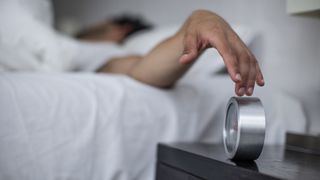Just one energy drink a month can shorten sleep time and increase the risk of insomnia, research shows
Packed with caffeine and often loaded with sugar, we turn to energy drinks when we’re looking for a boost. However, that afternoon boost may have become a late-night sleep disruptor, with research showing that the buzz from energy drinks can linger long after bedtime. And new research has shown that it’s not just those who regularly enjoy energy drinks who experience the effect: even regular consumers may find that energy drinks cause them to miss sleep.
Experts surveyed a group of 53,266 students between the ages of 18 and 35 about their energy consumption and sleeping habits. The study, published in the BMJ Open JournalResearch found that daily consumption of energy drinks correlated with going to bed 33 minutes later, waking up 25 minutes later, shorter sleep duration, longer time needed to fall asleep and a greater likelihood of insomnia. That’s essentially everything from the moment you climb into bed at night to the moment you drag yourself out the next morning.
How many energy drinks can make a difference?
While it may come as no surprise that regularly consuming energy drinks can disrupt sleep, the research also showed a link between occasional energy drink consumption and sleep problems. Those who drank only one to three energy drinks per month reported worse sleep than those who never drank them.
Strikingly, 32.7 percent of women who rarely drank energy drinks reported insomnia. That rose to 40.6 percent among women who drank energy drinks one to three times a month. Additionally, men who never or rarely drank energy drinks reported a rise time of 8:03, rising to 8:10 among those who drank only a few energy drinks per month.
The more energy drinks consumed, the greater the effect on sleep. Participants who drank at least one energy drink daily reported 30 minutes less sleep than those who drank them rarely. Insomnia also increased significantly (from 32.7 percent in women to 50.6 percent, and from 21.8 percent in men to 36.6 percent), and men reported having their bedtime pushed back from 11:32 p.m. to 12 a.m.: 05 hours.
Although the study showed a link, the link between energy drink consumption and poor sleep could not be directly confirmed. It also couldn’t explain the reverse effect: those who slept worse to begin with might be more likely to turn to energy drinks to help them get through the day.
Although this study is not without flaws, the results do support it comparable studies That has included a link between low-quality sleep and energy drink consumption.
Does this mean you should give up energy drinks altogether? Since good sleep has been linked to a longer lifespan, it may be worth thinking about. But before you do that, consider what exactly you’ll be drinking instead. Energy drinks typically contain high levels of caffeine, and many are also packed with sugar. If you swap your morning energy drink for a cup of coffee with three sugars, your sleep problems may persist.

